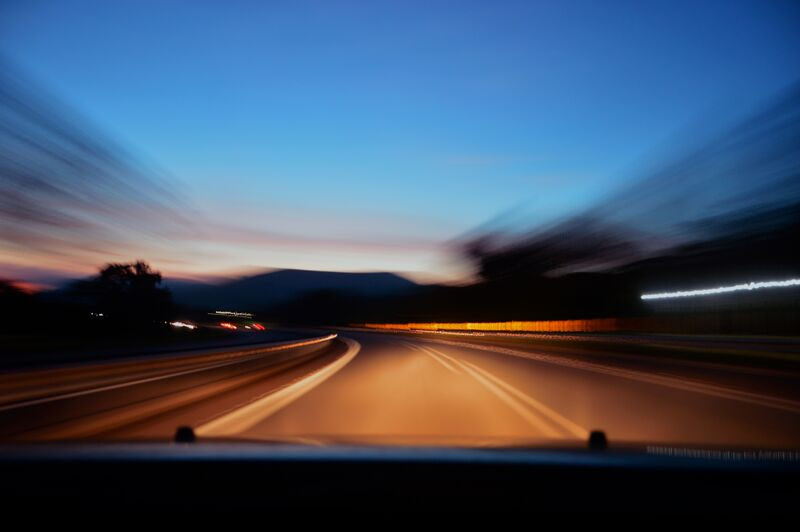I come to and I’m behind the wheel. My hands grip the fake leather steering wheel of the old Buick, bare tires propelling us forward with some force that’s calmly settling into my control. This car died months ago, and sat hopelessly on the grass in front of my father’s house like a sun-bleached lawn ornament until someone finally shelled out three hundred dollars in cash and dragged it away.
Stumpy, I’d called it, because of the time I ran over a tree stump in the woods and almost tore my muffler off. Our maiden voyage, ending in a smashed side mirror and a mangled rain guard. I kept that useless piece of plastic in my trunk until the day we prepared it to be sold, peeling off the stickers and moving the old record player that sat in the trunk into my abandoned blue bedroom. The rain guard was tossed in the trash, hopefully to be recycled into something more useful. Plastic to plastic, dust to dust. The car, I think, was taken apart piece by piece and whatever couldn’t be pawned off was turned into scrap metal. The broken EGR valve, the cigarette lighter that had no power, the faulty brakes. I can’t imagine there was much to sell.
Nick reaches a long muscular arm from the backseat and turns the radio down, muttering something about a headache.
Annoyance hits with gritted teeth and narrowed eyes. I catch myself wanting to scold him for changing my radio settings so soon into the trip, and realize I have no idea how long I’ve been driving. I don’t ask. My mind reaches backwards for information and everything begins to fog over, condensation forming faster than I can wipe it off. Something peers back at me, cold and silent. My grip tightens until I’m white-knuckled on the wheel and I focus my eyes on the road ahead.
The sun must be somewhere behind us because I can’t see it, but I know it’s there. Its yellow light stains every surface of this decrepit town, bathing us and the world around us in a sickly aura. Instinctively I reach for a cigarette, pushing the glowing heat of the cigarette lighter onto the tip and taking a smoke-filled breath. The burns on the soft fabric interior have a familiar pattern, but a creeping sensation tells me that this car is a stranger to me. Something is different.
The lines on the road are faded almost into nothingness, and the street signs passing by us seem to have little to say, but I just keep driving. Time passes by like a bullet through a gun. I don’t look at the passenger seat.
“Your brain, like the world around us, uses hierarchies. Smaller pieces come together to form larger ones, like this couch. A frame, covered in upholstery, stitched together by thread. Without the smaller parts, there is no couch.”
I move my free hand across the fabric we’re laying on, feeling the worn threads beneath my bruised fingers. I wonder if the cat fur embedded in the fabric is considered a part of the couch, and if we stay long enough, will we be considered part of the couch as well?
“When you perceive the world around you,” he goes on, “it enters your brain in hierarchies. Tiny bits of information, lines and curves and colors identified by groups of cells, move up the levels of your brain to form larger images.”
We both look around, as if we’ll start seeing the world in bits and pieces if we just try hard enough. The security light outside shines through the back door, shedding a few drops of light on an otherwise dark room. My eyes struggle to perform under these conditions.
I come to and I’m behind the wheel. I realize, slowly at first then torrentially, that I have been here before. Between my middle and pointer finger, caught between chipping black nail polish and dry cracked skin, a lit cigarette. My throat feels like sandpaper- this is not my first. In the center console sits an open pack, nineteen left. I remember my cigarette lighter, the one that never worked. I understand now how a rabbit feels when it finally understands that the whiff of fur it caught on the wind was fox, and that it’s already too late to run. I don’t run. Nick reaches forward, and turns down the radio. He tells me he has a headache.Hand over hand, just like I learned in driving school, I pull into the parking lot of a convenience store. This is not one of the screeching tire turns that my passengers are used to, I am not that person today. Today I am quiet, careful, and deliberate. I nestle the car cleanly between two faint white lines in the middle of the vacant lot, and press my cigarette into the empty ashtray. I haven’t thrown a smoke out the window since I was seventeen and I saw a picture of a dead bird with its stomach full of cigarette butts. After that, every time my cat brought me a dead animal I had to resist the urge to cut it open and empty it out, searching through soft pink
innards for half-smoked cigarettes whenever I needed a nicotine fix.Two car doors slam one after the other and I remember that I’m supposed to be going into the store. Keys in hand, I follow them in. Yellowing paint peels off rotting wood, and the smell of gasoline fills my nose. I look back at my car, and the passenger seat is empty.
There is no bell on the door to alert anyone of our presence, but as we move through the thick air it feels as though there are eyes on us. Even Nick, usually talkative, walks down the aisles ahead of me and does not fill the silence. A row over from us, through lines of expired soup cans and spices, someone is watching. My eyes slowly meet theirs, and I am hit with a cold unsettling fear. All of a sudden, the need to leave is stronger than the fear of disturbing the peace. With my mind in autopilot I quickly grab everything I need, toss money at the counter, and head back to the car. My hands shake as I put the key in the ignition and turn the car on, slamming it into drive and peeling off with no clear image of where I’m going.
“What if something goes wrong?”He laughs quietly, running a hand up and down my sore back as footsteps echo upstairs. “Well your brain works in prediction. The higher levels, the ones that receive the whole picture, they send down predictions of what should happen next. If that doesn’t happen, you seek further input. Which is why people tend to fixate on things that seem out of place.”
The footsteps stop abruptly, and the lack of noise rings in my ears. It’s 2 AM and there’s lead coating my brain, dragging my head down to the arm of the couch where I close my eyes, almost forgetting the world around me. Almost, but something isn’t quite right.
I come to and I’m behind the wheel. The same aging buildings pass outside my window over and over again, but I’m not seeing a road to turn onto. Something, anything to get off this street. Out of this town. A small dirt road jumps out to the left and I slam the brakes, chest meeting the steering wheel as I turn. I reach over and shut off the radio.Dust kicks up behind us and I wonder how much more of this my old car can take. As we slowly ascend the hill through the trees, I can’t help but feel like the town refuses to be left behind. Like we’re taking something with us that might never go away. I brush aside those thoughts and keep driving, gripping the steering wheel like it’s the only thing keeping me from tumbling back down.
We reach the top slowly and deliberately, like a funeral procession meeting a cemetery. I park the car at the edge of a cliff, silently praying to whatever god might be watching.
Nick and I get out of the car. He hands me something, and when I look down I realize that we had gotten lighter fluid and a pack of matches at the store back in town. Suddenly, I understand.We work quickly, rolling down all the windows and dousing the interior and exterior of the car. That feeling of panic that had overcome me at the store threatens to set in again, and I try to keep it together. I grab one last cigarette and leave the pack in the car, taking a few steps back. I use a match to light my cigarette, slowly breathe out smoke, and toss the still-burning match into the car. I don’t look at the passenger seat.
We put distance between us and the car, and climb up on a rock to watch it burn. Nick tells me to relax, he tells me it’s over, and I try to believe him. After a while, I fall asleep with the glow of the fire still flickering below us.
“But what happens if the feedback loop just keeps going, if you never find new input? Can your brain just keep predicting, and searching, and not finding?” I can’t shake the feeling that there’s something I’m not being told. “There’s always new input,” he promises, chest slowly rising and falling like the ocean. “Your brain never stops looking for more information, filling every gap with the world around you. It’s seamless, you don’t even know it’s happening. The perfect machine to be trapped in.”
Satisfied, I lay my head back down and focus on his calm breathing. Slowly I drift off, like a raft in the water.
I come to and I’m behind the wheel.
Laura Parker is a second-year nursing student at Stockton University and is from Atco, New Jersey. She has been published in Stockton’s lit magazine, Stockpot, won second place in the Mimi Schwartz Creative Nonfiction Contest and received honorable mention in the Jennifer Cakert Poetry Contest.

